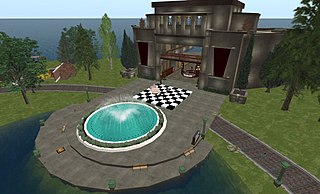
The National Chemical Laboratory (NCL) is an Indian government laboratory based in Pune, in western India.

The Indian Museum is a massive museum in Central Kolkata, West Bengal, India. It is the ninth oldest museum in the world and the oldest and largest museum in India and Asia, by size of collection. It has rare collections of antiques, armour and ornaments, fossils, skeletons, mummies and Mughal paintings. It was founded by the Asiatic Society of Bengal in Kolkata (Calcutta), India, in 1814. The founder curator was Nathaniel Wallich, a Danish botanist.

The Cornell University Library is the library system of Cornell University. As of 2014, it holds over eight million printed volumes and over a million ebooks. More than 90 percent of its current 120,000 periodical titles are available online. It has 8.5 million microfilms and microfiches, more than 71,000 cubic feet (2,000 m3) of manuscripts, and close to 500,000 other materials, including motion pictures, DVDs, sound recordings, and computer files, extensive digital resources, and the University Archives. It is the sixteenth largest library in North America, ranked by number of volumes held. It is also the thirteenth largest research library in the U.S. by both titles and volumes held.

Khadi, derived from khaddar, is a hand-spun and woven natural fibre cloth promoted by Mahatma Gandhi as swadeshi (self-sufficiency) for the freedom struggle of the Indian subcontinent, and the term is used throughout India, Pakistan and Bangladesh. The first piece of the hand-woven cloth was manufactured in the Sabarmati Ashram during 1917–18. The coarseness of the cloth led Gandhi to call it khadi. The cloth is made from cotton, but it may also include silk or wool, which are all spun into yarn on a charkha. It is a versatile fabric that remains cool in summer and warm in winter. To improve its appearance, khadi is sometimes starched to give it a stiffer feel. It is widely accepted in various fashion circles.

A virtual museum is a digital entity that draws on the characteristics of a museum, in order to complement, enhance, or augment the museum experience through personalization, interactivity, and richness of content. Virtual museums can perform as the digital footprint of a physical museum, or can act independently, while maintaining the authoritative status as bestowed by the International Council of Museums (ICOM) in its definition of a museum. In tandem with the ICOM mission of a physical museum, the virtual museum is also committed to public access; to both the knowledge systems embedded in the collections and the systematic, and coherent organization of their display, as well as to their long-term preservation. As with a traditional museum, a virtual museum can be designed around specific objects, or can consist of online exhibitions created from primary or secondary resources. Moreover, a virtual museum can refer to the mobile or World Wide Web offerings of traditional museums ; or can be born digital content such as, 3D environments, net art, virtual reality and digital art. Often, discussed in conjunction with other cultural institutions, a museum by definition, is essentially separate from its sister institutions such as a library or an archive. Virtual museums are usually, but not exclusively delivered electronically when they are denoted as online museums, hypermuseum, digital museum, cybermuseums or web museums.

The National Institute of Science Communication and Information Resources (NISCAIR), located at New Delhi, India, was an information science institute in India founded in 2002. In 2021, the institute was merged with National Institute of Science, Technology and Development Studies to form National Institute of Science Communication and Policy Research (NIScPR). It operated under the umbrella of the Council of Scientific and Industrial Research (CSIR) that comprise 38 other labs and institutes in India. The institute published several academic journals and magazines.

Indira Gandhi National Centre for the Arts (IGNCA), New Delhi is a premier government-funded arts organization in India. It is an autonomous institute under the Union Ministry of Culture.

Gujarat Vidyapith is a deemed university in Ahmedabad, Gujarat, India. This institute was founded in 1920 by Mahatma Gandhi, India's "Father of the Nation" and the leader of the Indian independence movement. It has been deemed university since 1963.

The National Archives of India (NAI) is a repository of the non-current records of the Government of India and holds them in trust for the use of administrators and scholars. Originally established as the Imperial Record Department in 1891, in Calcutta, the capital of British India, the NAI is situated at the intersection of the Janpath and Kartavya Path, in Delhi. It functions as an Attached Office of the Department of Culture under the Ministry of Culture, Government of India.

The University Libraries are the academic library system for Bowling Green State University and its regional campuses.

The National Institute of Molecular Biology and Biotechnology, also known as NIMBB, is a research institute of the University of the Philippines (UP). It has four branches distributed across various UP campuses, namely: UP Diliman (NIMBB-Diliman), UP Los Baños (BIOTECH-UPLB), UP Manila and UP Visayas.

The National Mine Map Repository (NMMR) is part of the United States Department of the Interior (DOI), Office of Surface Mining Reclamation and Enforcement. The NMMR resides in the Pittsburgh suburb of Green Tree, Pennsylvania, and collects and maintains mine map information and images for the entire country, including data and maps of coal mines in the anthracite coal region of northeastern Pennsylvania. The Green Tree facility provides and stores, digitally and in microfilm, over 182,000 maps of abandoned mines. This repository contains maps of mine workings from the 1790s to the present day. It serves as a point of reference for mine maps and other information for both surface and underground mines throughout the United States. It also serves as a location to retrieve mine maps in an emergency. The NMMR provides services ranging from retrieving mine related data for economic analysis to assessing the potential risk associated with underground mining. Through analysis of mine maps and related information, the repository assists private and public sectors in industrial and commercial development, highway construction, and the preservation of public health, safety, and welfare. In addition, they collect, reproduce, and maintain a national inventory of mine maps and supporting documentation for private and public interests.

The Central and Eastern European Online Library (CEEOL) is a repository of full text indexed documents in the fields of Humanities and Social Science publications from and about Central and Eastern Europe. The collections include native language sources from and about Central, East and Southeast Europe's humanities and social sciences in the form of journal articles, eBooks and Grey Literature.

The Renton History Museum is a repository for objects and archives significant to the city of Renton in the state of Washington, United States. The museum has objects and archives of Renton's history and has exhibits and public programs for the community and visitors. It is a joint initiative between the city of Renton and the Renton Historical Society, a non-profit organization providing private sector support for the museum.
A memory institution is an organization maintaining a repository of public knowledge, a generic term used about institutions such as libraries, archives, heritage institutions, aquaria and arboreta, and zoological and botanical gardens, as well as providers of digital libraries and data aggregation services which serve as memories for given societies or mankind. Memory institutions serve the purpose of documenting, contextualizing, preserving and indexing elements of human culture and collective memory. These institutions allow and enable society to better understand themselves, their past, and how the past impacts their future. These repositories are ultimately preservers of communities, languages, cultures, customs, tribes, and individuality. Memory institutions are repositories of knowledge, while also being actors of the transitions of knowledge and memory to the community. These institutions ultimately remain some form of collective memory. Increasingly such institutions are considered as a part of a unified documentation and information science perspective.
The Insurance Regulatory and Development Authority of India (IRDAI) is an autonomous and statutory body under the jurisdiction of Ministry of Finance, Government of India. It is tasked with regulating and licensing the insurance and re-insurance industries in India. It was constituted by the Insurance Regulatory and Development Authority Act, 1999, an Act of Parliament passed by the Government of India. The agency's headquarters are in Hyderabad, Telangana, where it moved from Delhi in 2001.

Shodhganga : a reservoir of Indian theses is a digital repository of theses and dissertations submitted to universities in India.
Mohammad Islam Khan (1957–2010) was an Indian glycobiologist and a scientist at the National Chemical Laboratory. Known for his studies on the biology of Lectins, Khan was an elected fellow of the National Academy of Sciences, India, Maharashtra Academy of Sciences and the Muslim Association for the Advancement of Science. The Department of Biotechnology of the Government of India awarded him the National Bioscience Award for Career Development, one of the highest Indian science awards, for his contributions to biosciences in 2002.

In India, the Open Access movement started in May 2004, when two workshops were organized by the M S Swaminathan Research Foundation, Chennai. In 2006, the National Knowledge Commission in its recommendations proposed that "access to knowledge is the most fundamental way of increasing the opportunities and reach of individuals and groups". In 2011, the Council of Scientific & Industrial Research (CSIR) began requiring that its grantees provide open access to funded research, the Open Access India forum formulated a draft policy on Open Access for India. The Shodhganga, a digital repository for theses, was also established in 2011 with the aim of promoting and preserving academic research. The University Grants Commission (UGC) made it mandatory for scholars to deposit their theses in Shodhganga, as per the Minimum Standards and Procedure for Award of M. Phil./Ph.D. Degrees Regulations, 2016. Currently, the Directory of Open Access Journals lists 326 open access journals published in India, of which 233 have no fees.